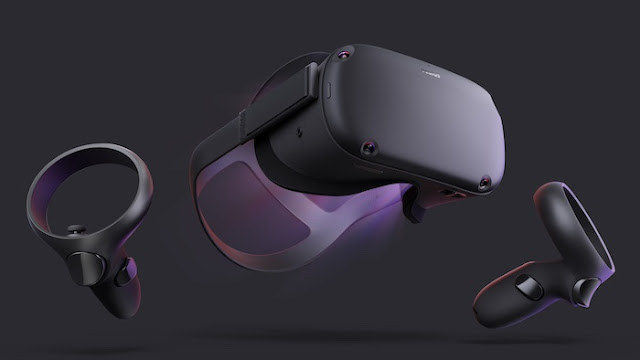Why
I'm Worried About the Future of VR
A look "under the hood" of the Oculus Connect. This image depicts how the technology/camera combines in-real-life object detection with the position of the user to overlay VR features with that environment
It's not often that
I leave a tech conference keynote feeling like I just attended an academic
seminar in which I had mistakenly enrolled.
Of course, being a natural cynic, I have left them
with skepticism. "Will that product actually ever
roll out?" "Does the technology really work
the way it appears to in video demos?"
When I outlined my key predictions for Oculus Connect
yesterday, I was perhaps approaching it from an over-optimistic point-of-view
(which, if you know me at all, is highly out of character).
I had hoped to see
more use cases for VR that involved training people in the workplace, helping
them get to know each other in a safe (virtual) environment before meeting in
person -- a possible integration with Facebook for Dating -- and donating VR
headsets to underserved schools to aid learning. But what we heard today didn't
reflect that.
Instead, we
received one major announcement -- the future launch of the Oculus Quest -- a
heavy emphasis on new gaming features, and an extensive lesson on how the
history of Big Tech will dictate VR's future. And while the adoption of VR
today is nowhere near mass usage, the picture painted for the future of VR
could be cause for concern.
And for the
hardware, it has to be okay to wear in public without 1) walking into trees,
walls, and other people, or 2) looking weird. That means that the ultimate
mixed reality headset -- the one that truly leads to a mass adoption of VR --
can't be a headset at all. It has to be a pair of glasses.
VR for the Masses: A Good or Bad Idea?
As with most emerging technologies, there are both
positive and negative sides to a future where, as we're able to "combine the real with the virtual whenever we
want."
On the plus side, we have benefits for those who suffer from
mental health issues like panic disorders: a future in which these users can
instantly converge something calming -- like a positive environment replete
with a guided breathing exercise -- with the panic-inducing environment or
situation around them.
But when evaluating the drawbacks of such usability, I point to
the fact that so many of us -- myself included -- already engage in the unhealthy habit of constantly looking down at or checking our phones,
no matter what we're doing or who we're with. Technology
has already caused us to evolve to a point of being addicted to mobile devices
in a way that's diminished our attention spans and empathy -- especially among younger generations who
could actually live to see this future.
Now, layer that present reality with a future one where VR usage
is commonplace in everyday life. We're simultaneously over-connected, but are
also soiled from real-life engagement with others -- and even when we do
venture into public, can easily replace what's actually happening around us
with a virtual "improvement."
It's a future that's a way's off -- and that's if My
vision of mass consumption of VR comes to fruition. But if it plays out in this
manner, the long-term implications should be considered.
Should this future
come true -- one where we can quickly overlay actual reality with something
else -- could it also evolve us to a point when we're no longer being able to
cope with conflict, stress, or other scenarios where we've historically relied
on survival instincts?
Many other things
would need to happen first. More people would have to start using VR, perhaps to
the extent to which we use smartphones. More people will have to be able to
afford it, too. And there might have to be rules -- perhaps within the same
vein of outlawing texting while driving, or using phones in the classroom among
a certain age group.
But there are those
who can see both sides of the issue -- how VR can be used for extreme good, but
that it should be approached with caution.
But if Oculus truly wishes to put people first, and
put an emphasis on the human side of technology -- its long-term impact on the
very people into whose hands these products will go should be carefully and
slowly evaluated. Like many other modern developments, there's a
column each for the pros and cons of VR.


Comments
Post a Comment